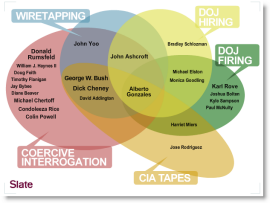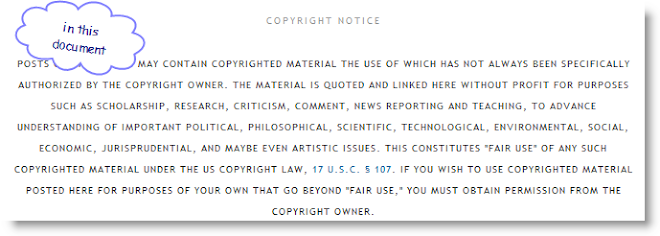How TalkingPointsMemo Beat the Big Boys on the U.S. Attorney StoryPaul McLeary
Columbia Journalism Review
It's almost too perfect. A mainstream reporter mocks a story a blogger has been working to break, asserting that "it all makes perfect conspiratorial sense!", and that the blogger is "seeing broad partisan conspiracies where none likely exist," only to backtrack a few weeks later when the story explodes across the front pages of the major dailies.
If you wanted to force the issue -- and we would be surprised if some MSM-hating critic doesn't -- the episode illustrates perfectly how the Washington press corps ignores the blogosphere at its own peril. But the story, and its implications, are actually far more complicated -- and for journalism, heartening -- than that.
Still, the image is great. While the mocking reporter, Time magazine's Washington bureau chief Jay Carney, was busy dumping, via Times Swampland blog, on the story of U.S. Attorneys being fired across the country, Josh Marshall of TalkingPointsMemo, and two of his reporters at his offshoot site, TPMuckracker.com, Paul Kiel and Justin Rood, were busy reporting, using a variety of sources that had been largely untapped by the mainstream press.
To be fair, Carney wasn't dismissing the story out of hand, but his snark hardly masked his belief that Marshall & Co. were out on a partisan limb, hyping a story that just wasn't there.
As we now know, there is most definitely some "there, there," and the press has been all over the story for more than a week, discovering that the paper trail that led to the firings leads, on some level, to the White House. Many (including two Republican members of Congress) have called for Attorney General Alberto Gonzalez to step down, and the Democratic controlled Congress is licking its chops to hold hearings and issue subpoenas.
Despite his early misgiving about the story, on March 2 Carney finally came around, saying this his "hat is off" to TalkingPointsMemo and "everyone else out there whose instincts told them there was something deeply wrong and even sinister about the firings." And then came the words that bloggers have so longed to hear: "The blogosphere was the engine on this story," Carney wrote, "pulling the Hill and the MSM along...what happened was much worse than I'd first thought. I was wrong. Very nice work, and thanks for holding my feet to the fire."
But before bloggers crack open the bubbly and start dancing around burning piles of dead tree media, it's important to remember that Marshall and his team of bloggers were hardly the only ones paying attention to the story. TPM reporter Paul Kiel says that David Kurtz, a reader of TPM who posts for Marshall on the weekends on TalkingPointsMemo, noticed some stories in the Arkansas papers about Timothy Griffin -- a former adviser to Karl Rove -- replacing Bud Cummins, the U.S. attorney for the Eastern District of Arkansas. Then on January 12, TPM's Justin Rood flagged a piece in the San Diego Union-Tribune that raised questions about the firing of U.S. Attorney Carol Lam, and according to Kiel, "that's when our collective hair caught fire, and over the next couple days, putting Griffin's appointment together with Lam's [story], and then the other firings as they were reported, we went back and tried to put the pieces together."
At the time -- mid-January -- TPM's reporters were surveying media around the country and following up links to local papers sent in by readers, "so it was kind of a mix of what you might call blog reporting and traditional reporting," or what might be termed a kind of "wisdom of crowds" method of reporting, combined with some good old-fashioned banging of the phones.
Kiel also credits McClatchy and the Las Vegas Review Journal with doing some good early reporting on the burgeoning story concerning how the Bush administration had forced some attorneys out and replaced them with party loyalists.
This mixing of tips from readers, hitting the phones, and ferreting out tidbits in local papers was exactly what Marshall had in mind when he launched TPM as an investigative reporting blog last year. "What I wanted to do is create a blog where bloggers could do original reporting full-time, and pay them salaries," he says. "Most bloggers aren't full-time journalists, and it's a commitment of time that is nearly impossible unless you have the financial resources to pay people a living."
That said, Marshall seems to be blazing a unique middle ground between "citizen journalism" and true investigative reporting, while not buying in to some of the more robust claims by some in the blogosphere (particularly on the right) that this "new journalism" is crushing traditional news-gathering operations. In fact, if it weren't for reporters at smaller newspapers around the country raising alarms in the first place, the story would likely have died a quiet death.
As someone who spent years inside the world of traditional print reporting, Marshall knows that the resources newspapers and magazines can bring to a story still dwarf what he and his team can do. "To the extent that we're competing head to head with the Post and the Times," he says, "we're gonna get creamed." But the U.S. Attorney story is a case where his operation was able to run with a story in a way that the big newsrooms can't, or won't. "Obviously, they've got hundreds of reporters and we've got two or three," he says, but now that the story has blown up, the big boys with the stocked newsrooms are going to be getting the lion's share of the major scoops. And on some level, that's just fine with Marshall. "This is sort of the nature of our role in the journalistic ecosystem," he says. "Once a story catches fire, the big players are going to start getting the big scoops...and we think that's great because we think we've played a big role in breaking the story in the first place."
The most important part in keeping on top of the U.S. Attorney story while the mainstream media dragged its heels comes from the relationship bloggers have with their readers, one which mainstream reporters don't have. Marshall says that while readers send in relevant articles from local papers and news broadcasts, he and his staff don't accept everything at face value, and fact check it just like any news organization would. Where TPM benefits in the initial fact-gathering process is that the blog, like most blogs, has a more intimate relationship with its readers, who send in tips. "We have a readership of about 100,000 people," he says, "and that means that in any city around the country we've got a bunch of readers who are reading the local papers. So we'll often find out if something happens that's only reported in some small paper -- we basically have an intelligence gathering service that mainstream reporters don't have because they don't have the same kind of relationship with their readers."
Obviously, sites like TPMuckraker are few and far between, since most bloggers don't have the time and resources to spend all day reporting and checking out stories. But in a way, this model of reporting is a great example of straddling the divide between old school shoe-leather reporting and the more aggregate method of Web reporting. And with the U.S. Attorney story at least, TPM's staff was able to weave the disparate strands of information into a coherent whole -- well before most, if not all, of the big D.C. newsrooms. Just ask Jay Carney.
oOo
Kos has the story of the story of the story too.











